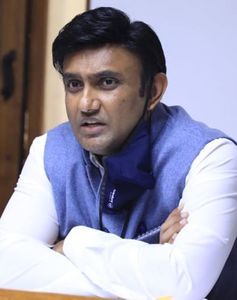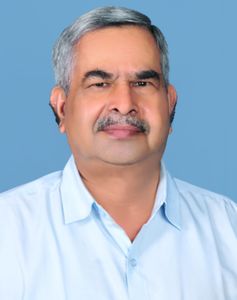I solemnly pledge...” vow doctors around the world as they begin their journey of healing. The universal code of medical ethics, based on the Hippocratic oath, symbolises the dedication of their lives to the service of humanity. Named for the Greek physician Hippocrates, the oath has, over the years, undergone multiple revisions to suit an evolving society. And India could soon join a host of countries that have either revised or replaced the ancient oath.
The National Medical Commission (NMC) is reportedly thinking of replacing the Hippocratic oath for MBBS graduates with the Maharishi Charaka Shapath—an oath in the name of Charaka, the “father of Indian medicine” and the author of the Charaka Samhita, a treatise on ayurveda.
The speculation began when the minutes of a February 7 meeting—hinting at the change—were circulated on social media. Dr Aruna V. Vanikar, president of the Undergraduate Medical Education Board, had chaired the meeting. The 32-member NMC, which regulates medical education and practices in India, has neither confirmed nor denied the news. “The NMC has not held any meeting to discuss replacing the Hippocratic oath with the Charaka Shapath yet,” said Dr M.K. Ramesh, former president of the Post-Graduate Medical Education Board. “The issue had cropped up during a virtual meeting chaired by the UGMEB president to discuss the time table and curriculum with the deans and principals of medical colleges. Apparently, one of the attendees prepared an informal MoM (minutes of the meeting) and shared it on social media. It was certainly not the official proceedings of an NMC meeting, but informal minutes of a UGMEB meeting.”
However, the speculation was enough to spark a debate and divide medicos.
While several doctors have welcomed the proposal, saying it honours an Indian icon and acknowledges India’s contribution to the field of medicine, many others want to maintain “uniformity” and avoid exclusion of Indian doctors from the global community. Some also suspect a “hidden agenda” of the BJP government to undermine allopathy and promote AYUSH—the indigenous systems of medicine. They have called it “mixopathy”.
Karnataka Health Minister Dr K. Sudhakar recently held an online poll to gauge people's response to the speculation. Around 70 per cent of the 2,000-odd polled supported it. “I see no reason why we should not accept and welcome the Charaka Shapath, which is a great tribute to the legendary Indian physician,” he told THE WEEK. “It will help instil deep-rooted pride among our young doctors—who are the inheritors of such a great intellectual heritage—on being Indian in thought, spirit, intellect and deeds.”
Renowned cardiologist Dr Devi Shetty has also endorsed the move. “We should be proud of our ancestry,” he said. “We inherited medical education from the British and have hardly made any changes. It is good that we are [thinking of] taking oath in the name of our ancestor rather than in a foreigner’s name.”
Agreed Dr Ramesh: “Both Hippocrates and Charaka existed when allopathy was unheard of. The purpose of administering an oath is to instil ethical values in a person entering the profession. Both oaths stress on professional ethics and conduct of medical practitioners. Let us not forget that Charaka was no ordinary man. What is wrong in honouring an Indian physician who was meritorious like Hippocrates?”
Not everyone is on board, though. In a joint statement, IMA Kerala president Dr Samuel Koshy and secretary Dr Joseph Benaven said: “Oaths should follow an international outlook and must be beyond the views of caste, race, gender and creed. The oath is meant for the betterment of human beings and it [should] be suitable for modern science, which promotes constant questioning and corrections... the Charaka Shapath is based on regionalism and it insists on aspects that hinder the personal freedom of woman patients, promotes superstition and is not suitable for scientific methods.”
IMA national president Dr Sahajanand Prasad Singh said there had been no official confirmation about the move, but added that the IMA would oppose it.
Said former IMA president Dr Ravi Wankhedkar: “The decision to replace the oath is totally irrational. Instead of creating unnecessary controversies or symbolism, the NMC should focus on improving quality of medical education, protecting the dignity of modern medicine and welfare of young medicos.”
Tejas J., president of the Karnataka Association of Resident Doctors, said, “All residents, interns and doctors are not in favour of changing the Hippocratic oath as we want to continue with the old tradition. Localising the oath looks good for non-medical persons. I graduated two years back and we have taken the oath as per the Geneva declaration (The World Medical Association revised the Hippocratic oath and promoted it as the Declaration of Geneva in 1948. It was last revised in 2017). We want the oath to be universal.”
He admitted to not having read the Charaka Shapath, but added, “The government is free to revise the oath depending on current demands. But it should focus on enhancing the health care infrastructure in government teaching hospitals and also reduce the medical fee if it is serious about producing quality doctors with professional ethics. Replacing or renaming an oath helps little to boost health care in the country.”
Congress MP Shashi Tharoor tweeted: “Many doctors are expressing concern. I am all in favour of introducing Indian elements into Indian education, but not at the expense of universal values and standards. Why can’t the Charaka Shapath supplement rather than supplant the Hippocratic oath that doctors worldwide take?”
Indian Medical Association Karnataka president Dr Kateel Suresh Kudva argued that both oaths were outdated. “Both are ancient and irrelevant today,” he said. “Not many have read the Charaka oath. This code cannot be followed by modern medical professionals. For instance, it prescribed that one must not treat persons who are against the king. Similarly, the Hippocratic oath is also not relevant today and the World Health Organisation had to come up with the Geneva declaration. In India, we follow many oaths—Hippocrates, Charaka, Geneva declaration, MCI ethics, IMA prayer. The oath needs to undergo change from time to time.”
Both Hippocrates and Charaka were early proponents of preventive health care and contributed to the understanding of human anatomy, pharmacology and medical geography. The former oath is believed to be written between the 5th and 3rd century BCE in Ionic Greek, while the latter was written in Sanskrit in the 2nd century BCE. If the Hippocratic oath swears by Greek gods, the Charaka Shapath reveres the holy fire and learned people.
Both oaths profess total dedication to the guru, and underline the importance of professional ethics and conduct. Both have also been called out for being “sexist”. While the former says: “I will not give to a woman a pessary to cause abortion”, the latter reads: “I shall treat a woman only in the presence of her husband or a near relative”. The reference to “Dwija” (twice born) has also been tagged as “casteist”.
“If the Geneva declaration has been revised multiple times, the Charaka Shapath, too, holds ample scope for revision to address current challenges and ethical dilemmas,” said Dr Ramesh. “This fine-tuning will come only out of discussion. It is too early to dismiss the proposal as redundant.”
Also, Dr Sudhakar pointed out that there was no single universally accepted version of the physician’s oath. “The American Medical Association describes its Code of Medical Ethics as a living document that has evolved as medicine and society have changed,” he said. “The AMA’s Code was adopted in 1847, and saw updates in 1903, 1949, 1957 and 2008. The WMA adopted an international code of medical ethics in 1949, which was amended in 1968, 1983 and 2006. Last May, the WMA published a proposed modernised version of the international code, outlining physicians' duties towards their patients, other physicians, health professionals and society as a whole. At AIIMS, the undergraduates have been taking the Charaka oath during their annual convocation for several years now.”
A section of the medical fraternity has also alleged saffronisation of medical education and undermining of modern science.
Dr Kudva said: “There appears to be a hidden agenda to push indigenous systems of medicine. Our doctors will be expected to be jacks of all trades and masters of none. This will eventually eliminate the modern system of medicine and also alternative systems like ayurveda and homoeopathy. India is a hub for medical tourism, but pushing for integrated medicine will affect the health care industry and also deny our doctors opportunities outside India.”
Recalling the constitution of the NMC by an act of Parliament in September 2020, he said: “We had also opposed the NMC replacing the MCI (Medical Council of India) as we doubted the intent of the government. In sections 50 and 51 of the NMC Act (on exchange of ideas), the government has indicated that it wants to bring in an integrated system of medicine. In the Medical Education Policy, too, it was clearly spelt out that, by 2030, India would only have an integrated system of medicine.”
Dr Ramesh, who recently became vice-chancellor of Rajiv Gandhi University of Health Sciences, Bengaluru, said “misconceptions” abound. “Integrated medicine does not mean mixing of two different systems,” he said. “Here, different modalities of treatment are practised in their pure form without any overlap. Integration at the level of availability [of treatment] is what the government has been trying to achieve. As medical practitioners, we must build harmony rather than create animosity towards different systems of medicine. We must be open to cross referral of patients.”




